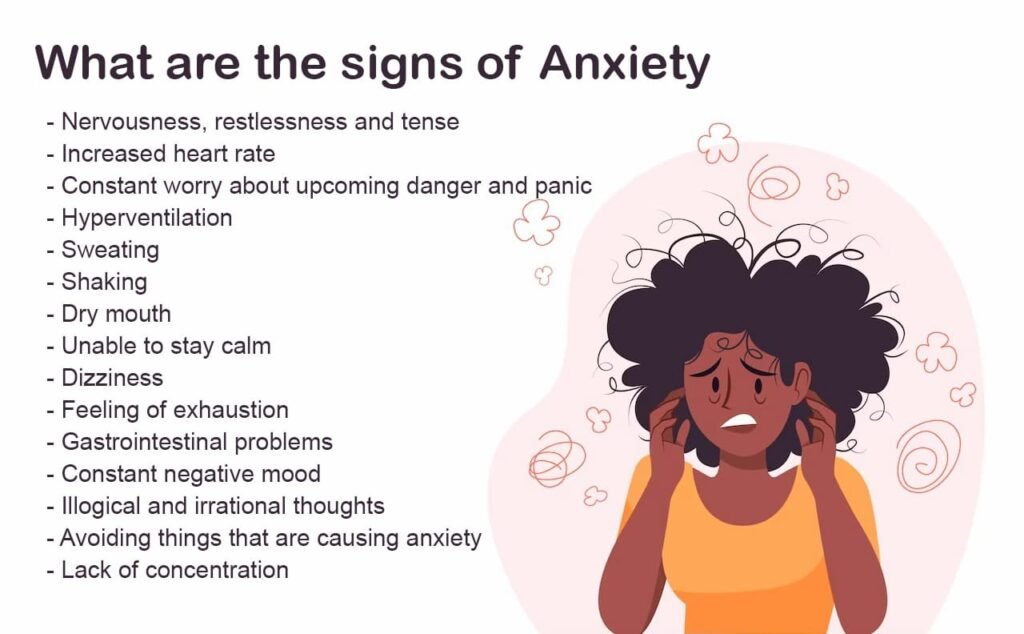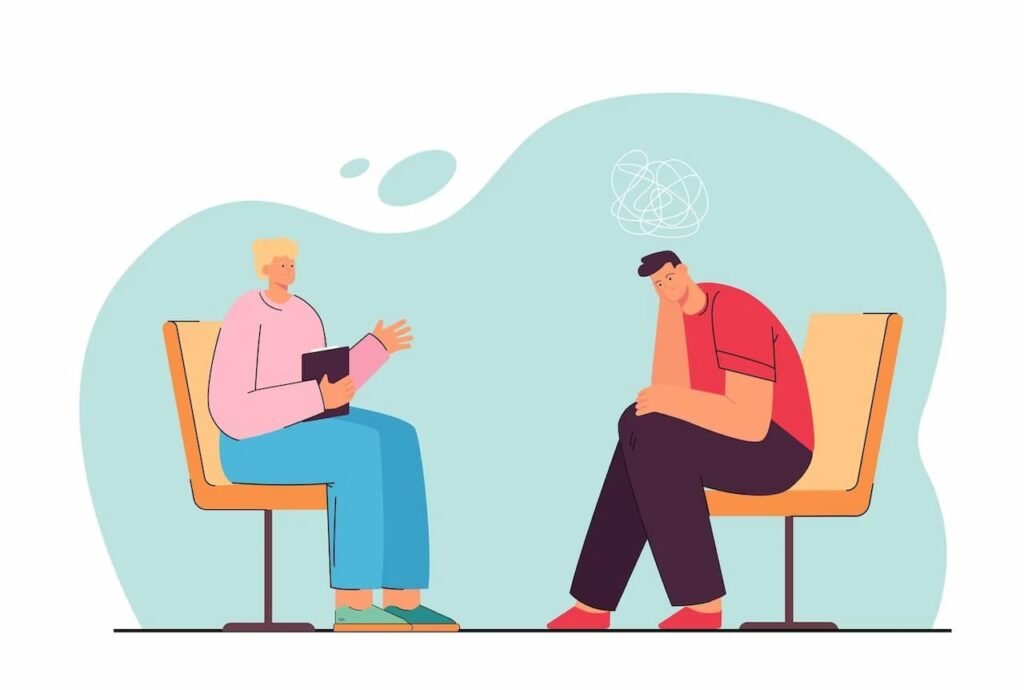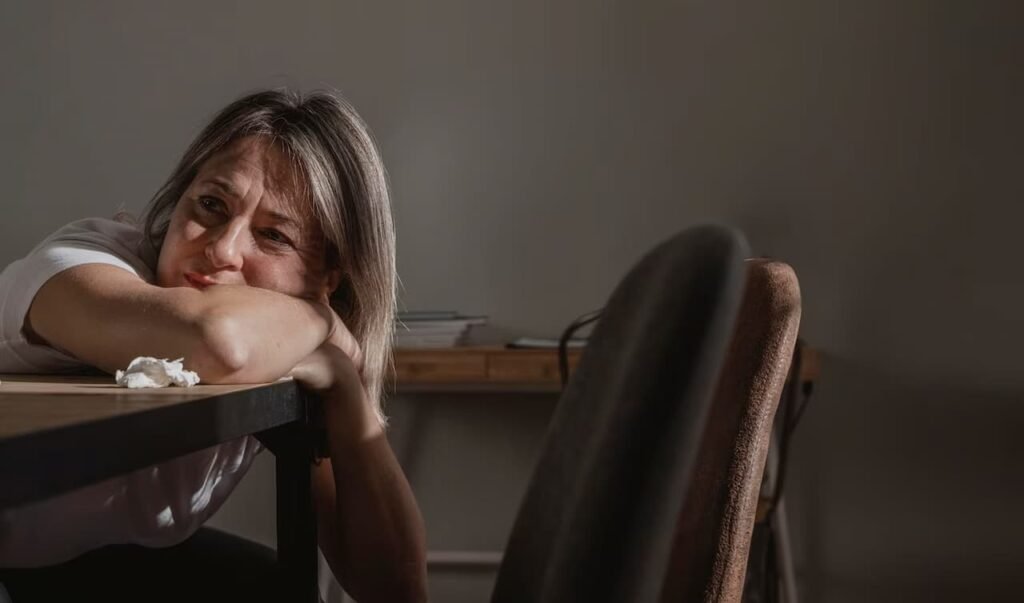Top Psychologists for Anxiety Counselling
Anxiety is very common these days as the stress level and workload of people is high. But seeking a professional help helps to manage the problems and understand what actually is happening and learn various coping techniques. But firstly let’s understand what an anxiety is?
Table of Contents
ToggleWhat is Anxiety?
The term “Anxiety” is actually used to refer to the worry, fear and unease one experience in case of fearful and dangerous situation or an event. Anxiety involves physical and emotional sensations that are unpleasant and makes a person nervous and worried. It is a feeling of apprehension about possible future dangers. Anxiety can create personal, health and psychological problems and can even turn into an anxiety disorder as well if not handled properly. It is a normal reaction for some people except people with anxiety disorder. They perceive anxiety as permanent, intrusive and uncontrollable.

What are Causes of Anxiety?
There is a complex mix of things that causes anxiety in a person. Sometimes, severe or long-lasting stress can cause change in the chemical balance that control our mood and fight-or-flight response. So, interference with the chemical homeostasis for a long time can lead to an anxiety disorder. According to the researches, it has been shown that deficiency of GABA (a neurotransmitter) is present in people with anxiety disorder. Environmental factors like trauma, work stress, death of a closed one, etc. have a major role in causing anxiety. Uncontrollable and aversive events have a high rate of leading to anxiety disorder if not managed properly.

Signs that you need Anxiety Counselling
If you are experiencing following symptoms then, you must seek Anxiety Counselling:
- Nervousness, restlessness and tense
- Increased heart rate
- Constant worry about upcoming danger and panic
- Hyperventilation
- Sweating
- Shaking
- Dry mouth
- Unable to stay calm
- Dizziness
- Feeling of exhaustion
- Gastrointestinal problems
- Constant negative mood
- Illogical and irrational thoughts
- Avoiding things that are causing anxiety
- Lack of concentration
- Sleeping problems

What does Anxiety Counselling involve?
Anxiety Counselling basically involves treating various anxiety disorders and helping clients to live a good quality of life while managing their chronic and excessive anxiety. It helps in reducing the symptoms of the disorders and teaching clients anxiety management techniques. An anxiety disorder is like any other health problem which should be treated. So, Anxiety Counselling helps with:

Generalized Anxiety disorder involves persistent worry and anxious feelings. Everyone has concerns in life related to health, finances, etc. But when these fears become chronic and excessive, then it is diagnosed as Generalized Anxiety disorder. It includes restlessness. Irritability, muscle tension, sleep disturbances, easily fatigued and lack of concentration.
Panic disorder involves people having brief and intense panic attacks with anxiety symptoms increasing rapidly within 10 minutes and can last more than 30 minutes and even an hour. These attacks are unexpected and are triggered by some aspects of a situation which sometimes can go unidentified.

Social anxiety disorder/ Social Phobia involves strong fear of more than one social situation like public speaking, using public washroom, express one’s opinion to a group of people, etc. In this disorder, people think that they will face negative outcome, humiliation and embarrassment that makes them avoid the situation altogether.
Phobia happens when a person shows intense and persistent fear in the presence of an object or a situation which causes significant distress levels. That one specific object or a situation acts as a trigger and are perceived as intrusive and disturbing.

Separation anxiety disorder is characterized by anxiety that’s too excessive experienced by children which occurs when they are separated from parents or anyone with a parental role.
Obsessive-compulsive disorder includes persistent and uncontrollable obsessions (feelings and thoughts) and to satisfy them doing compulsions (rituals and routines). It could be like washing hands, obsession with number 4, checking doorknobs, etc.

Post-traumatic stress disorder can develop after experiencing a severe physical and mental trauma and includes having flashbacks, nightmares and disturbing thoughts after the traumatic experience has ended.
Anxiety Counselling helps people in coming out of the illusory world created in their thoughts and images. Thus, they can enjoy the present moment and experience joy in life. It teaches clients to deal with the emotional response to the anxiety. Features of various therapies are utilized in the anxiety counselling to help clients reduce the symptoms and develop needed strategies in the counselling session.
The most widely used techniques in the anxiety counseling belong to cognitive-behavioral therapy which involves muscle relaxation techniques and cognitive restructuring techniques. These techniques help to change the cognitive distortions that clients have in their mind related to any object or situation which then leads to anxiety when it is present in the person’s environment.
Out of all the anxiety disorders, generalized anxiety disorder is the most difficult to treat but with the cognitive behavioral techniques, it has become possible to some extent that generalized anxiety disorder can be treated. These techniques bring a major change in the symptoms being experienced by the client. Counsellor keeps the treatment short-term in nature so that the clients learn the specific skills that are required in anxiety management.

Also, it helps in reducing symptoms and gradually returning to normal life. Through these techniques, counsellor makes the clients identify and understand their own negative automatic thoughts which are most of time illogical and irrational. Then counsellor even teaches the clients to change these cognitive distortions, inner thoughts and beliefs by developing new ones which will be factual, rational and logical.
Instead of saying, “I am going to fail in exam” and getting anxious one should learn to say that, “I have studied, there is nothing to be scared of, I’ll get good marks.” This is how counsellor teaches the clients to develop positive attitude and thoughts. It addresses the negative patterns that have been created in mind that is causing anxiety in normal day to day life and also in the way we look at ourselves and the world.
When the cognitive aspect (how negative thoughts and cognitions contribute to anxiety) and behavioral aspect (how clients behave and act in anxiety-provoking situations) are put together and managed then it becomes the most effective way to deal with anxiety. Not only the external aspects but even our personal factors also play a major role in leading to anxiety so it’s essential to change the perception of any situation altogether and counsellor helps the clients really well in doing it. Here is an example of how our own personal factor (self-statements) can cause changes in mood and thoughts and lead to anxiety.
Situation: You friends are calling you to a party.
Thought 1: I don’t want to go as there will be lot of people and I’ll surely make a fool of myself by doing something either embarrassing or humiliating.
Emotion 1: Sad and Anxious.
Thought 2: I am tired so I would rather rest at home and regain my energy.
Emotion 2: Neutral.
Thought 3: I like parties. It will be so much fun to meet everyone there.
Emotion 3: Happy and Excited.
With this example, it can be seen that our own emotions and thoughts have an important role in deciding whether anxiety will occur or not. So, the counsellor teaches skills which makes client think in positive way and avoid anxiety. Whole focus is put on client’s way of thinking, emotions pattern, attitudes, beliefs and expectations related to small things of everyday life. For people who have anxiety issues, negative thinking and emotions act like a fuel to their anxiety problems and make them worse than ever. So, it should be changed as soon as possible in the session with the help of the counsellor.
Sometimes, in counselling sessions, there is a technique used known as exposure and relapse prevention in which the counsellor expose the clients to the anxiety triggering situation or object while practicing muscle relaxation and deep breathing so that clients can learn to face their anxiety provoking object or situation without getting fearful and scared. Overtime, clients escape from the trap of their own anxiety and become free mentally. This new learning is believed to be done by changes in brain activities in the amygdala, a part of the brain which is involved in the perception of fear.
But this needs support and guidance throughout the counselling session as the situation can go out of control and there should be someone who is regulating the level of anxiety exposure being given to the client. Thus, the clients develop confidence and become ready to manage any anxiety provoking situation in life and reduce the anxiety symptoms also. This technique is highly used in treating obsessive-compulsive disorder in which the aim is to decrease the distress level of the client. It’s even used for the treatment of phobias like flying phobia, claustrophobia, hydrophobia or blood-injury phobia, it is highly effective when used in one long session.

Some counselling sessions are done in which the client is allowed to talk about anything and everything without any judgment fear, this is called free association. Sometimes, a chaotic pattern of thoughts can create anxiety in mind and result in anxiety disorder. So, talking about everything and letting the thoughts come out can be a therapeutic experience called catharsis. This is a very effective technique for treating anxiety issues.
Some skills which are helpful in managing anxiety and are taught in the counselling session:
- Acknowledging your feelings
- Identifying and understanding the triggers of the anxiety-provoking situations
- Engaging yourself in some sort of physical activity
- Learning to take breaks in between busy schedule
- Giving yourself compliments everyday
- Developing habit of journaling which is a therapeutic process to do daily
- Telling positive things to yourself in difficult situations like:
- I am feeling anxious but I can handle this
- I will practice deep breathing and it will calm down my anxiety
- I have survived enough and I can handle this also.
- Practicing mindfulness with yoga and meditation
- Finding a creative activity
Seek Professional Anxiety Counselling at Medavas
In Anxiety Counselling, client and the counselor work together to identify the symptoms and the main concern. Then counselor helps the clients to develop required skills and techniques to manage their anxiety in sessions as well as in the outside environment. And doing all this requires experience which Counsellors at Medavas have and they are specialized in this as well.
So, if you are experiencing anxiety and it is affecting your life’s different aspects then you must take anxiety counselling. The process of booking the appointment with our counselors is very easy and a smooth process. So, go ahead and book an appointment for yourself to enhance the quality of life and manage anxiety in healthy ways.

Frequently Asked Questions (FAQs) for Anxiety Counselling
What are the 3 components of Anxiety targeted in Anxiety Counselling?
Anxiety consists of 3 components: Cognitive component: Negative mood and worry about future worse consequences; Physiological component: Increased heart rate, sweating, etc.; and Behavioral component: Fearful response and panicking.
What are some other important tips given in Anxiety Counselling?
Taking care of the sleeping routine, having a healthy and nutritious diet, having a good and helpful social circle, focusing only on what you can control, monitoring emotions and thoughts on the regular basis, learning grounding exercise to deal with immediate anxiety, getting in touch with nature and asking for help when it’s important.
When normal anxiety turns into an anxiety disorder?
Anxiety is important in low and moderate levels as it acts as a motivator and helps to increase performance and achieve goals. But when it becomes maladaptive, severe and chronic then it can be diagnosed as an anxiety disorder in people. It impairs a person’s social, work and personal environment by causing disturbance.









